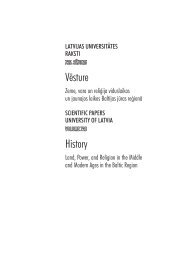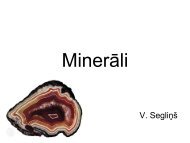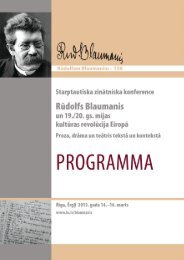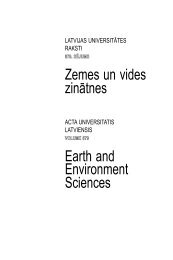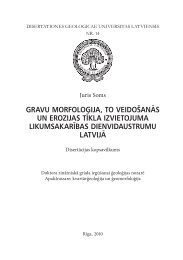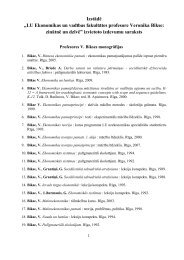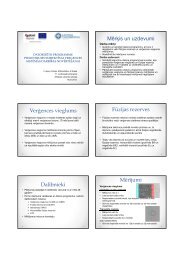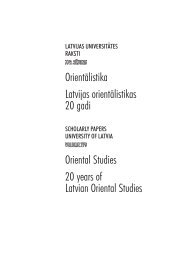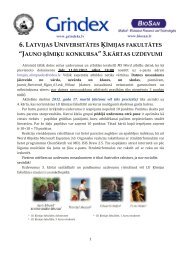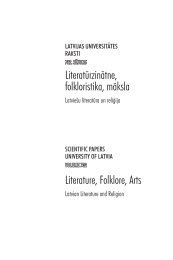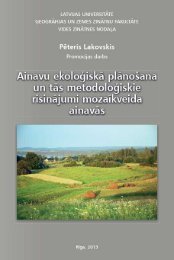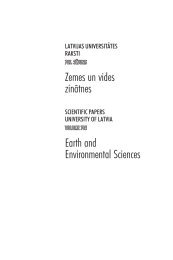Latgalistikys kongresu materiali, III. 2011. - Latvijas Universitāte
Latgalistikys kongresu materiali, III. 2011. - Latvijas Universitāte
Latgalistikys kongresu materiali, III. 2011. - Latvijas Universitāte
You also want an ePaper? Increase the reach of your titles
YUMPU automatically turns print PDFs into web optimized ePapers that Google loves.
Contemporary writers who write in Latgalian most often have a divided<br />
identity; they have a sense of belonging to the ethnic groups of both Latgalians and<br />
Latvians. But there are also writers with a holistic identity, who perceive themselves<br />
as being either wholly Latgalian or wholly Latvian. These write literary works either<br />
exclusively in Latgalian, exclusively in Latvian or use both languages. Furthermore,<br />
the adoption of an ethnic identity is a conscious decision for authors writing in<br />
Latgalian, as evidenced by the choice of language when Latgalian is one of two<br />
written languages and Latvian is the national language in another written form.<br />
For understanding a writer’s decision to write in a particular language, dialect<br />
or a combination thereof, the paper begins with biographical research and Paul<br />
Ricœur’s theory of recognition as set forth in Parcours de la reconnaissance.<br />
Ricœur’s postulates are applicable to any person’s relations with the world. Yet, they<br />
are especially relevant when applied to authors of literary works, since authors not<br />
only perceive the world and express themselves in it as everyone does, but also fix<br />
this perception and its expressions in an unchanging written form accessible to others<br />
in a particular language. With their choice of language, writers define their self,<br />
express themselves and reflect the world, identify with certain groups of people and<br />
separate themselves from others. At the same time, they address individuals who are<br />
close to them and from whom they desire recognition. In the case of the Latgalian<br />
language, it is also significant that Latgalian is a minority language; the decision to<br />
write in Latgalian indicates a feeling of belittlement by the majority encoded in the<br />
author’s self-image, the response to which is the author’s obstinate determination to<br />
add texts in Latgalian when addressing the Latvian mainstream.<br />
The lengthy ban on publishing in Latgalian led many writers with a Latgalian<br />
identity to publish their works in Latvian. Authorship in this case can be viewed<br />
through the prism of Gilles Deleuze’s and Félix Guattari’s postulates about minor<br />
literatures. The renewed freedom to publish in Latgalian has not only offered<br />
linguistic freedom of choice. It also means that authors can change their choice to<br />
write either in Latvian or in Latgalian in different works and may translate a work<br />
written in Latvian into Latgalian, thereby addressing the author’s ethnic group. On<br />
the other hand, non-Latgalian writers have other possibilities when writing in<br />
Latgalian, including the expression of a Latvian identity, a different world-view and a<br />
different narration.<br />
INESE PAKLONE<br />
inese.paklone@akka-laa.lv<br />
AKKA/LAA (Autortiesību un komunicēšanās<br />
konsultāciju aģentūra/<strong>Latvijas</strong> Autoru apvienība)<br />
A. Čaka ielā 97,<br />
Rīgā, LV-1011, Latvijā<br />
246



